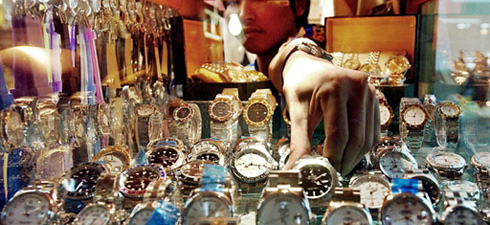They are an impulse holiday purchase that many buyers later have second thoughts about – the fake Louis Vuitton bags and Rolex watches picked up for a song abroad. While shoppers are happy with the price, there are often nagging doubts about the items' quality, their legality and who ends up profiting. However, such worries are, it seems, over. A new EU-funded report has declared that it is OK to buy fake designer goods.
The study, co-written by a Home Office adviser, says consumers benefit from the market for knock-off designer clothes at knock-down prices. It also rejects the complaints of designer companies, claiming that losses to the industry as a result of counterfeiting are vastly exaggerated – because most of those who buy fakes would never pay for the real thing – and finding that the rip-off goods can actually promote their brands.
The report adds that the police should not waste their time trying to stop the bootleggers. It disputes claims that the counterfeiting of luxury brands is funding terrorism and organised crime, and argues there is little public appetite for tough law enforcement measures as consumers enjoy the bargains offered by the illegal trade, which has been estimated to be worth £1.3 billion (€1.56 billion) in the UK.
Professor David Wall, who co-authored the report and advises the government on crime, said the real cost to the industry from counterfeiting could be one-fifth of previously calculated figures. "It's probably even less," he said. "There is also evidence that it actually helps the brands, by quickening the fashion cycle and raising brand awareness." He added: "We should be focusing on the trade in counterfeit drugs, dodgy aircraft parts and other stuff that really causes public harm. "At a time when there is no more public resources for police, and they are being asked to do more, law enforcement should be focusing on other things." Read full article in the Daily Telegraph...
Was this article useful? If so we are delighted!
It is freely available because we believe that the right to free and independent information is essential for democracy. But this right is not guaranteed forever, and independence comes at a cost. We need your support in order to continue publishing independent, multilingual news for all Europeans.
Discover our subscription offers and their exclusive benefits and become a member of our community now!












